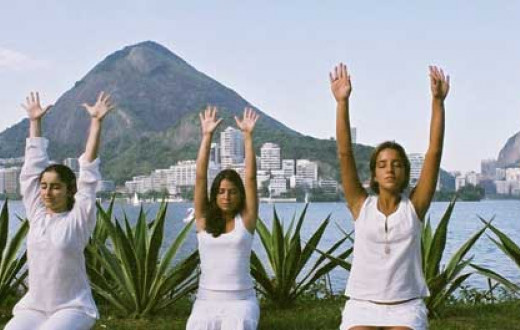Having been born and brought up in North East India, she always had a soft side for that part of the country. In 2001, she started her venture to teach meditation to the people of Darjeeling, Assam, Arunachal Pradesh, and Nagaland.
While on her journey to teach meditation to those people, she felt a touch of the warmth of the people there. Whether it was teaching a hardcore criminal in the jails of Kohima, a tribal leader in Arunachal Pradesh, or an intellectual politician in Shillong, she believes meditation brought out the innocence in each one of them.
In conversation with Pooja Tolani, a dynamic teacher, who is on the go to transform people’s life through meditation.
Q1 You have ventured into so many dangerous places in North East India and taught meditation to people there. Can you share some transformation stories? And what does meditation do, that people change so much?
In Shillong, I conducted a course in a drug de-addiction center. I had a group of about 15 boys, some of whom had been taking drugs ever since they could remember. On the first day of the course, they laughed and joked about what I was going to teach them. I was half their size and probably the only female in that facility at that time. They sat in front of me with blood-shot eyes, smelling of cigarettes, chewing pan. But all it took to completely transform them was one session of meditation and Sudarshan Kriya.
One of them, who had been suffering from insomnia for 13 years, slept like a baby that night. (Meditation can relieve people with insomnia). Today, one of those boys is an Art of Living Teacher! He is teaching so many others like him these days. He really set an example for other youth.
As tough as these boys looked, the child in them—an innocence—was evident right from the start. This is the core of every individual; only covered by stress in most cases. Meditation really helped them to wipe out their stress, break through the shackles of the past, judgments, prejudices, anger, and other inhibitors so that they could clearly see and be themselves, which is being in a state of love and service. They seemed to have only forgotten for a short period of time that life need not be what it was then for them. And they knew they were the only ones who could change it, and that too easily.
Q2 Sometimes the lives of people who live there is so full of challenges. How does meditation give a new direction to their life?
Yes, their lives are full of challenges, but whose isn't? The challenges may differ from person to person, but everyone faces them. A challenge for one may be a comfort to another. Only getting non-vegetarian food in Nagaland was a challenge for me but a huge comfort for the locals.
Yet everyone who meditates feels the same relief, peace, energy, and happiness. This is what makes meditation so universal. Anyone in any situation or stage in life can do it and benefit just the same. And these benefits are a means for people to realize that life need not be a challenge with a few moments of joy—life is mostly joyful with just a few challenges. Once they see this, life takes a new meaning.
Many people have shared that they feel like they've been given a new life. But in reality, they have only begun to experience the newness of their very ancient lives.
Q3 Can you share what are the challenges that people face there and how meditation can help in overcoming those challenges?
Some of the challenges that I've seen people face in the North East are a lack of proper education, unhealthy diet consisting of meat and alcohol, and not enough opportunity for creative outlet. All this leads to extremely short tempers, stress, and violence in them and their society. Meditation seems to be the only practical solution to all of this. Our education system teaches everything but the knowledge of the mind—how to handle the mind. Meditation helps you go even beyond the mind.
They indulge in meat, alcohol, and tobacco and use it as a stimulants. Meditation gives them so much energy that they don't feel the need for any external stimulants.
They don’t have enough opportunity for creative outlet. Meditation brings in them clarity and confidence to create these opportunities for themselves.
They become angry, stressed, and violent. Meditation makes them realize that that is not their true nature and takes them closer to what it truly is, peace and love.
Q4 We have heard that there is a lot of violence there. And Gurudev says, “Violence ends where love begins”. So do you also think that meditation can bring more love in people?
I am absolutely, 100 percent sure that it does! I have seen this knowledge prove itself true, whether it is in North East India, courses for terrorists, or with hardcore prisoners in jails across the world.
Q5 You taught meditation to some tribes! Could you share some experiences from there?
Yes I have. These experiences for me have been some of my biggest learning experiences, the most hilarious moments, and yet the most humbling, which have left me feeling nothing but grateful.
What the rest of the country hears or thinks it knows about the North East is that it's violent and unsafe. But I have lived there and know that it is one of the most beautiful, untapped natural beauties of our country. There is a certain innocence in the people there that is sometimes heart wrenching, a love that is so heartwarming. It just gets hidden sometimes. But all I needed to do was to make them meditate and it wasn't long that I could see those qualities shine in them. And these qualities shine most when those people meditate.




























